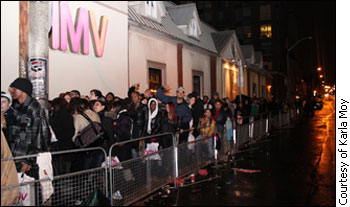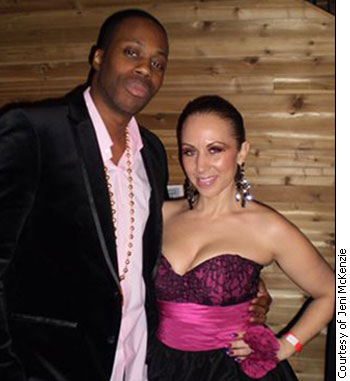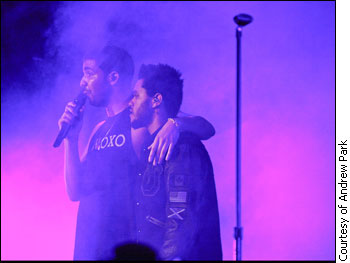Tags
Related Posts
Share This
Canadian hip-hop claims respect
An unsigned Canadian rap artist known for playing Wheelchair Jimmy on the hit TV series Degrassi took the rap scene by storm in 2009. Drake’s So Far Gone was the fifth-best-selling rap album of that year, with over 100,000 copies sold in the first two weeks of release.
A year earlier, Kardinal Offishall’s collaboration with American R&B artist Akon for the single “Dangerous” reached number five on the Billboard Hot 100. This made Kardinal the first Canadian rapper with a major chart hit in the United States.

Thousands waited in the rain at Toronto’s Queen Street HMV for Drake’s Take Care album signing, November 2011.
But the international breakthrough came when K’naan’s single “Wavin’ Flag” became the official Coca-Cola theme song of the 2010 International Federation of Association Football World Cup (FIFA). The song has since been a chart hit in at least 16 countries worldwide.
Now more than ever, Canadian hip-hop artists have emerged as mainstream stars, breaking into the American and international markets.
Although some call it a passing trend, many industry professionals see the recent exposure as representing a steady Canadian movement that’s just now become more prominent.
“The Canadian hip-hop scene has been going strong since the 1980s. Artists like Maestro and Michie Mee paved the way for the success of right now, which can’t be dismissed as a coincidence,” said Chris Jackson, a broadcast technician at CBC Radio. “This is not a copycat movement; Canadian artists are just mastering their craft better than ever, and the hard work is paying off.”
Jackson has been active in the hip-hop music industry for 25 years. As Senior Creative Director at Toronto-based rap label EasPark Productions in his spare time, he notes the Internet’s role in providing the platform for Canadian artists to expose their music.
“The Internet’s broken down the physical walls — it’s so much easier now to get music from artists around the world,” said Jackson. “Local artists used to be more self-contained in their own cities, but now they’re able to expand and grab hold of the larger market.”
Drake’s success
Such was the case with Drake’s So Far Gone EP, which was certified gold in July 2010 for sales exceeding 500,000. The Toronto-born rapper (real name: Aubrey Drake Graham) had garnered mild success locally with his previous efforts, Room for Improvement in 2006 and 2007’s Comeback Season, but these were nowhere near the accolades to come.
Jackson says that it’s partly luck but mostly because of digital exposure that Drake’s third effort caught the attention of wildly successful American rapper Lil’ Wayne. This resulted in Drake signing a 2009 multi-million dollar recording contract with U.S. label Young Money Entertainment.
The label, founded in 2005, has since released five number-one albums, including Drake’s debut studio effort, Thank Me Later, in 2010.
“So Far Gone was by far his greatest effort to date, so the quality was there. But without the Internet to expose the music, Lil’ Wayne would never have heard of Drake,” said Jackson.
Toronto’s Flow 93.5 radio host Jeni McKenzie acknowledges that while rappers like Drake and Kardinal Offishall have certainly tapped into the American market, any real prominence for Canadian artists is impossible without their being signed to U.S. labels.

Prince of the city. Kardinal Offishall, with radio host Jeni McKenzie, at his Toronto Christmas charity bash 2009.
“There is definitely a unique hip-hop movement in Canada, but in order for these artists to go mainstream, they can’t rely on Canadian record labels, which don’t have the financial backing,” said McKenzie.
She notes the strictly local success of artists like Classified and Buck 65, who are often played on Canadian radio but who have yet to be signed on an American label.
“Young Money and Lil’ Wayne had the financial resources to promote Drake’s albums and create his marketing brand,” said McKenzie.
She says it was part of their business marketing strategy for Drake to proudly represent his roots in Canada. Often referred to as “Toronto’s hometown hero,” he consistently name drops his love for the city in his lyrics.
“I know for a fact Lil’ Wayne sat Drake down and told him he needed to make his album at home, film his music videos behind Toronto backdrops and surround himself with the city’s support,” said McKenzie. “He’s a smart businessman; he’s making sure the city belongs to him.”
She adds that Drake’s marketing strategy has been beneficial for other local artists coming up.
‘Up North Wave’ a branding ploy?
Anupa Mistry, a Toronto-based freelance journalist who covers hip-hop, agrees with McKenzie.
‘It’s become cool to say you’re from Toronto.’ — freelance journalist Anupa Mistry
“Drake often brands himself as being a part of an ‘Up North Wave,’ which is partly mythological, a branding ploy,” said Mistry. “The spotlight he’s created does, however, bring attention to other Canadian artists who otherwise wouldn’t have had the exposure.”
For example, she said, there’s the Toronto-based Airplane Boys, recently featured in Complex magazine. And The Weeknd is an artist whose rise to success is directly related to being promoted by Drake on Twitter. The Weeknd was also asked to open at the yearly OVO concert series founded by Drake. Sold out for the past two years since its formation, the concert is known for having special guests like Stevie Wonder and Jay-Z.
“Maybe in the past Canadian artists put out their music without relating back to their roots. But now, with Drake putting the spotlight on them, they’re more prone to capitalize on that,” said Mistry. “It’s now become cool to say you’re from Toronto and to feel like you’re a part of a movement.”

Canadian bakin’. Hip-hop artist The Weeknd, opening for Drake, at Toronto’s OVO Fest in July 2011.
Jackson agrees that in addition to the Internet, it took a big “marquee” star like Drake or Kardinal to bring the spotlight to Canada.
“It’s definitely something local artists should take advantage of, because this doesn’t happen often,” said Jackson. “Now more than ever, artists in Canada should focus on making sure they put out unique music to capture an audience.”
McKenzie can only hope that the “Up North Wave,” even if fabricated as a brand, continues to bring attention to Canadian talent.
“There are so many different cultures expressed in our hip-hop. Shad has the African influences; Classified’s got the East Coast; and Kardinal has the reggae beats,” said McKenzie.
“We’ve got a bunch of amazing talent here that is different from the rest. And it’s exciting.”





